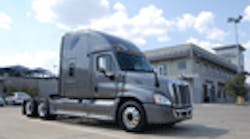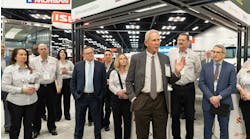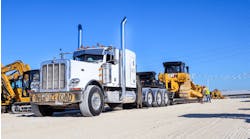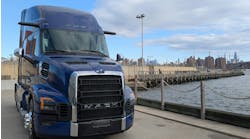DALLAS, TX. A laundromat, showers, a big screen TV theater complete with three rows of plush seating, and a pet hotel are amenities fleets and drivers alike might expect to find in a truck stop, not a truck dealership.
Yet these are just some of the extras built into the massive 24-acre Dallas Freightliner-Western Star dealership, owned by the Around The Clock Freightliner Group LLC (ATC), located just off I-20 about 15 minutes south of Dallas, TX. The extras are aimed at maximizing what gm Mark Lamont calls “customer convenience” in the fast-paced world of freight these days.
“Fleets and owner-operators alike are under tremendous business pressures these days to meet deadlines and be efficient,” he explained in a sit-down interview with Fleet Owner. “Their time is very limited.”
And those factors were incorporated into the location and construction plans for ATC’s new Dallas dealership, which opened in 2009, said Lamont.
The company’s original dealership for the area, which is still in operation, is located in downtown Dallas off I-35E on Irving Blvd. But ATC found that being inside the city limits could add up to an hour and one-half of travel time to the typical trucker and potentially exposed them to rush-hour traffic, Lamont said.
That’s why ATC built its new Dallas location on the outskirts of Dallas, right behind a TravelCenters of America truck stop, he noted. “It’s much easier for the trucker to reach us and they have access to everything they would need, from maintenance service at our facility to everything a truck stop offers,” Lamont explained.
All the OEMs are trying to reorient their dealerships in a likewise fashion. Brother companies Volvo Trucks North America and Mack Trucks, for example, are trying to tie their 330 dealers closer together on the maintenance level via a new system called MVASIST which is designed to create consistent service levels and parts pricing across their dealership network.
Daimler Trucks North America, which counts Freightliner Trucks and Western Star Trucks as subsidiaries, is doing something similar with its Express Assessment program, whereby dealers use dedicated diagnostic technicians to analyze a single vehicle problem within two hours and then repair it in four hours, if possible.
“The main goal of this program is to expedite minor repairs to minimize vehicle downtime for customers,” said ATC’s Lamont. “Because when a truck is down, for a fleet or owner-operator, revenue is not being made.”
Reducing downtime for repairs at dealerships is also being complicated by a growing shortage of truck technicians within the industry – an issue for all dealerships, Lamont noted.
“That’s probably our biggest challenge here,” he said, noting that ATC’s new Dallas location has 85 maintenance bays served by a staff of 46 technicians. “I could put another 15 technicians straight to work and keep their hands full, if I could find them.”
Yet Lamont stressed that today’s dealership now needs to go even farther, beyond the typical constants of trucks sales and service.
Many drivers, for example, travel with pets and if their truck is going to be in the shop for several hours, they need a safe place to house them. That’s why ATC constructed a shaded and fenced in “pet hotel” in back of its new facility, complete with water hose and picnic table, he explained.
This is but a small example of what Lamont calls an effort at “total integration” on the dealership’s part, to construct a “one-stop shop” literally under one roof that can take total care of a fleet’s or driver’s needs, from a 24/7 maintenance and part shop to onsite laundromat, showers, TV theater, and customer business center complete with PCs, printers, and Internet access.
“We want our location to become a ‘destination’ if you will for the fleet or the driver,” Lamont explained. That means being able to buy new trucks, used trucks, financing, maintenance, and parts all under one roof that minimizes out of route mileage – with all the amenities a driver needs when stopped for service, he noted.
“So if a fleet is sending trucks through our area, hauling freight to other parts of the country, they may decide to have their drivers stop here for service knowing we’ll have everything they need,” Lamont said.



